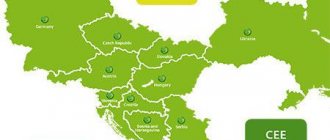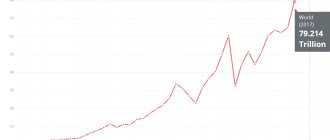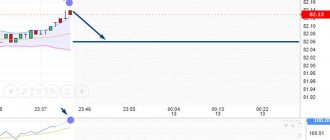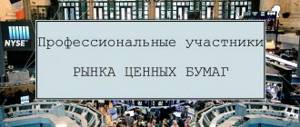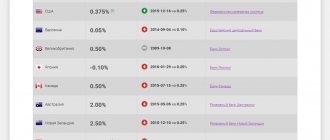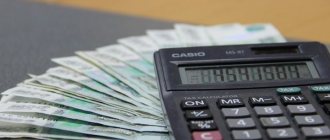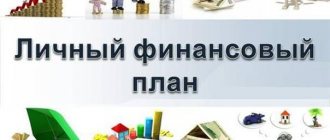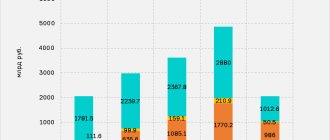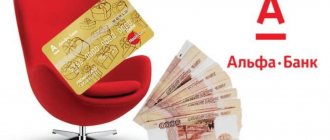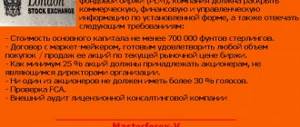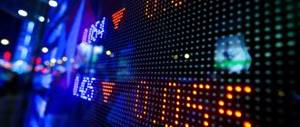A secondary market is a market where already issued securities and financial instruments are traded. It includes both exchanges and the over-the-counter market. An exchange is a formally established stock exchange on which securities are traded and has a specific set of rules for participants.
When trading is done through an exchange, it is supervised by the exchange and thus ensures that all rules and regulations are properly followed. Conversely, the over-the-counter securities market, known as OTC, is a dealer-based securities market that is a decentralized and unorganized market where trading is carried out by telephone, email, etc.
The difference between the stock market and the over-the-counter market is discussed in detail below.
Participants in financial markets, their rights and obligations
- Central banks issue (issue) national currency, store gold reserves and gold and foreign exchange reserves, issue loans to their commercial banks and control them;
- financial regulators exercise control over financial market participants by issuing them licenses and regularly checking audit reports;
- commercial banks issue loans to businesses and individuals, but do not have the right to trade in financial markets for clients' money;
- investment banks, trust funds, investment funds, ETFs, investment funds and hedge funds act as large investors, investing in financial assets of commodity and stock exchanges;
- stock exchanges organize trading in securities and derivatives (connecting participants to their own trading platform, maintaining the trading floor, etc.), but cannot trade on the financial market themselves;
- issuers of securities (shares and bonds) list their securities on the stock exchange and provide public statistics on the company’s activities on a quarterly basis;
- market makers provide liquidity to securities on the exchange by buying out all investor orders to sell or buy (therefore, traders often accuse market makers of “playing against the market”, because they need to return back to the market those financial instruments that they bought from traders);
- underwriters - conduct IPOs and help new issuers of securities get listed on the stock exchange. If the client’s shares are successfully brought to the market, they become market makers of these financial instruments, maintaining a constant balance of supply and demand for them, the size of the spread, ask and bid prices, etc.;
- brokers are intermediaries in concluding transactions in securities, currencies, currency pairs and derivatives on the orders of clients (traders and investors) and only at their expense, usually on the NDD, STP and ECN accounts of this broker;
- traders and investors trade in financial markets at their own expense through one of the brokers, which provides them with leverage and provides margin trading for trading large lots in the financial market;
- clearing companies (Prime brokers, etc.) ensure mutual settlements between professional participants in financial markets based on the final balance of participants at the end of each trading session;
- depositories store securities certificates in physical and electronic form and/or provide services for recording ownership rights to securities, taking into account the regular change of owners;
- registrars (registrars) register the issue of registered securities listed on the stock exchange;
- insurance companies reduce risks in financial markets.
For other participants in the financial markets, see more in the main article Basic terms of the exchange from Masterforex-V traders.
What is an exchange and why is it needed?
An exchange is a market for the simultaneous participation of a large number of sellers and buyers. Here transactions are concluded for the purchase and sale of stock assets - shares, bonds, depositary receipts, derivatives (futures, options).
An intermediary between trading parties, working in accordance with established rules that all market participants are required to follow. This is the essence of the exchange as an organizer of trading.
Financial Market Instruments
Main articles: Financial instruments and financial assets through the eyes of Masterforex-V traders
Financial instruments
are investment “quasi-money” ( holdings) of investors and traders, the sale of which at market quotes through a broker, stock exchange or on the over-the-counter market ensures the receipt of funds with a profit or loss.
Traditionally, financial market instruments include:
- freely convertible and reserve currencies (USD, EUR, CNY, JPY, GBP, CHF) are an instrument of the money market (National Banks, banks, payment systems), but de facto hard currency is used in all financial markets - for more details, see the main article Who are they 18 freely convertible currencies of the world and what gives this status?
- currency pairs and cross rates (EUR CNY, CAD ALL, GBP BYN, etc.) - instruments of the Forex currency market (see characteristics below)
- quasi-money (stocks, bonds, stock indices, etc.) - instruments of exchanges on the stock market;
- commodity futures (gold, oil, wheat, natural gas, etc.) - commodity market instruments;
- cryptocurrencies (bitcoin, ether, etc.) - financial instruments of the cryptocurrency market;
- CFD (Contract For Difference) is a “contract for difference” in the over-the-counter market.
Functions
The following functions of the exchange market are distinguished:
- Organizes tenders that are transparent, open to participants and price traceable.
- Determines the price of goods formed as a result of market trading.
- Ensures compliance with the terms of concluded transactions.
- Develops a system for transactions.
- Resolves issues and disputes arising between parties during the bidding process.
- Provides market participants with the necessary information.
The main function of the exchange market is to set prices for goods traded in different sections.
The remaining tasks are aimed at accurately and completely ensuring and satisfying the needs of the trading parties.
Stock financial market
- Main articles: stock exchange and stock market through the eyes of Masterforex-V traders
The stock market (equity market) is a financial market for securities and derivatives, from their issue to IPO, listing of shares on the stock exchange and their free purchase and sale. The following assets are traded in this market: stocks - blue chips, common and preferred stocks, bills of lading, options, bonds, checks, treasury bills, index futures, trust certificates, forward contracts, savings certificates, depositary receipts, mortgage certificates, repos, warrants, ETF units, leading stock (stock) indices.
Capitalization (value) of the entire stock market by April 1, 2021. reached $84.86 trillion. and then exceeded $100 trillion. in 2021. Those. It was for this amount that investors purchased the financial assets listed above for “real” (fiat) money. For details, see the main article in the economic dictionary wiki Masterforex-V Stock market capitalization.
Leading stock exchanges of the world:
| Exchange | Index | Exchange | Index |
| North America | Near and Middle East | ||
| NYSE (New York Stock Exchange) | Dow Jones 30, S&P 500 | BIST (Istanbul Stock Exchange) | BIST 30, BIST 100 |
| NASDAQ | NASDAQ 100, NASDAQ National Market Composite, NASDAQ Biotechnology Index | TASE (Tel Aviv Stock Exchange) | TA 35 |
| TSX (Toronto Stock Exchange) | S&P/TSX 60 | QSE (Qatar Stock Exchange) | QE index |
| BMV (Mexican Stock Exchange) | S&P/BMV IPC, S&P/BMV INMEX | ADX (Abu Dhabi Stock Exchange) | ADI |
| BNV (Costa Rica Stock Exchange) | Costa Rica Indice Accionario> | Tadawul (Saudi Stock Exchange) | TASI, SAR |
| South America | |||
| Brasil Bolsa Balcao (Sao Paulo Stock Exchange) | Ibovespa | Europe | |
| BCS (Santiago Stock Exchange) | IGPA, IPSA | LSE (London Stock Exchange) | FTSE 100 |
| Euronext | Euronext 100, CAC 40, BEL 20, AEX 25, PSI 20, ISEQ 20 | ||
| Asia | FSE (Frankfurt Stock Exchange) | DAX 30, Euro Stoxx 50, MDAX, TecDAX | |
| BSE (Bombay Stock Exchange) | BSE SENSEX 30 | BME (Madrid Stock Exchange) | IBEX 35, IGBM |
| NSE (National Stock Exchange of India) | NIFTY 50, NIFTY Next 50, NIFTY 100 | MOEX (Moscow Exchange MICEX-RTS) | IMOEX, RTS, MOEXBC |
| KLSE (Malaysian Exchange) | FTSE Bursa Malaysia KLCI | SWX (Swiss Stock Exchange) | SMI 20 |
| TWSE (Taiwan Stock Exchange) | TAIEX | WBAG (Vienna Stock Exchange) | ATX |
| KRX (Korea Stock Exchange) | KOSPI, KOSDAQ | OSE (Oslo Stock Exchange) | OBX25 |
| HOSE (Ho Chi Minh City Stock Exchange) | VN Index | GPW (Warsaw Stock Exchange) | WIG 20, WIG |
| TSE (Tokyo Stock Exchange) | NIKKEI 225, TOPIX Core 30 | PSE (Prague Stock Exchange) | PX, PX-TR, PX-GLOB |
| SSE (Shanghai Stock Exchange) | SSE Composite, SSE 50 | Australia | |
| SZSE (Shenzhen Stock Exchange) | SZI | NZX (New Zealand Exchange) | S&P/NZX 10, S&P/NZX 50 |
| HKE (Hong Kong Stock Exchange) | HSI | ASX (Australian Securities Exchange) | S&P/ASX 200, S&P/ASX 20 |
| SGX (Singapore Exchange) | STI | ||
| PSE (Philippine Stock Exchange) | PSEi | Africa | |
| SET (Stock Exchange of Thailand) | SET | JSE (Johannesburg Stock Exchange) | JTOPI |
How to make money on the stock exchange: investing vs trading
According to the results of various studies conducted on world stock exchanges, more than 70% of day traders (intraday trading) lose their money within six months.
This is active trading, speculation in the market. At the same time, look at the chart of the MICEX index or S&P500 for 5-10 years. An absolute minority is able to produce better results over such a period than the indices. If you are confident that you will trade as well as Livermore, then trade. Otherwise, it is better to learn the art of investing. There are fewer nerves, and the result is usually better.
Commodity financial market
Main article: commodity exchange.
The main financial instruments of the commodity market are commodity futures traded on the largest commodity exchanges in the world - these are “supply contracts” for platinum, lumber, Brent oil, iron ore, silver, potatoes, ethylene, cocoa, WTI oil, oil, methanol, URALS oil, aluminum, Oman Crude Oil, copper, coffee, rubber, natural gas, tin, cotton, gas oil, lead, jute, soybean, fuel oil, cobalt, gasoline, benzene, uranium, steel, sugar, diesel, biodiesel, lithium, coal, zinc, electricity, ethanol, kerosene, molybdenum, liquefied gas, pepper, barley, corn, wheat, rice, oats, palladium, orange juice, soybean oil, sunflower, soybean meal, brass, livestock, pork carcasses, milk, cheese, rapeseed oil, palm oil, nickel, polypropylene, etc.
Largest commodity exchanges in the world:
| State | Exchange | National currency | Financial regulator |
| North America | |||
| USA | ICE (Intercontinental Exchange, theice.com), CME (Chicago Mercantile Exchange, cmegroup.com), CBOT (Chicago Board of Trade, cmegroup.com/company/cbot.html), COMEX (Commodity Exchange, part of NYMEX, cmegroup.com/ company/comex.html), Minneapolis Grain Exchange (MGEX, mgex.com), NADEX (binary options exchange, nadex.com), NYMEX (New York Mercantile Exchange, cmegroup.com/company/nymex.html) | USD | NFA, CFTC, SEC |
| South America | |||
| Argentina | Rosario Futures Exchange ROFEX (rofex.com.ar), Buenos Aires Futures Exchange MATBA (matba.com.ar) | A.R.S. | CNV |
| Asia | |||
| Malaysia | KLSE (Kuala Lumpur Futures Exchange, bursamalaysia.com) | MYR | Labuan FSA |
| Singapore | SGX (Singapore Exchange, sgx.com) | SGD | M.A.S. |
| India | MCX (mcxindia.com), NCDEX (ncdex.com) | INR | SEBI |
| China | Dalian Commodity Exchange (dce.com.cn), Zhengzhou Commodity Exchange (CZCE, english.czce.com.cn), HKE (hkex.com.hk) | CNY | CSRC |
| Taiwan | TWSE (Taiwan Stock Exchange, twse.com.tw) | TWD | CSRC |
| Türkiye | BIST (Borsa Istanbul, borsaistanbul.com) | TRY | C.M.B. |
| UAE | Dubai Gold and Commodity Exchange (DGCX, dgcx.ae), Dubai DME Exchange (dubaimerc.com) | AED | Dubai FSA |
| Japan | Tokyo Commodity Exchange (TOCOM, tocom.or.jp), Osaka Dojima Commodity Exchange (ODE, osaka-dojima.org) | JPY | JSDA |
| Europe | |||
| Russia | MOEX (Moscow Exchange, moex.com), St. Petersburg International Commodity Exchange (spimex.com), JSC National Commodity Exchange (namex.org), FORTS (Moscow Exchange derivatives market, moex.com/s96) | RUB | Bank of Russia |
| Great Britain | LME (London Metal Exchange, lme.com), LIFFE (London Futures Exchange, theice.com/futures-europe) | GBP | FCA |
| Oceania | |||
| Australia | ASX (Australian Securities Exchange, asx.com.au) | AUD | ASIC |
| Africa | |||
| South Africa | Safex (South African Futures Exchange, jse.co.za/trade/derivative-market/commodity-derivatives) | ZAR | FSCA |
| Ethiopia | Ethiopian Commodity Exchange (ECX, ecx.com.et) | ETB | National Bank of Ethiopia |
Important recommendations for choosing a reliable broker
The reliability of a broker is determined by the following parameters:
- Work experience in the financial services market (including the forex market).
- Level of financial regulator, availability of licenses.
- Availability of a representative office in the trader’s country.
- Use of segregated accounts.
- Level of quote providers (important for the Forex market).
- 24/7 multilingual technical support.
It is important to study trading conditions in detail, paying attention to:
- minimum deposit size;
- trading terminal functionality;
- type and size of spreads;
- set of assets;
- leverage range;
- minimum size and “step” of lots;
- types of order execution;
- availability of ECN accounts;
- the ability to use robo-advisors;
- permission for scalping.
TOP of the best and reliable brokers for trading
The rating of top forex brokers includes companies that are not known to manipulate the withdrawal of client funds, offer favorable trading conditions and have licenses from recognized financial regulators.
Is Forex a real foreign exchange market or a scam?
Forex (Foreign exchange market) is the world's largest financial market for the conversion (exchange) of currencies with a daily turnover of $6.6 trillion. (as of April 2021) This is the amount of real “live” money exchanged for each other in just one day all over the world.
Forex market participants (who exchange such gigantic amounts) are National (Central), commercial and investment banks, hedge funds, stock, cryptocurrency and commodity exchanges, exporters and importers, tourism businesses and airlines, as well as more than a billion ordinary citizens who, through various payment systems in the world (from VISA and PayPal to Qiwi, Sberbank Online@yn, Alfa-click, Privat 24) make payments with constant currency exchange.
It is not difficult to calculate how much is 1.5% -2.5% , which is retained as a spread by financial institutions specializing in currency exchange. It turns out that they have an income of $99 billion to $165 billion per day. We repeat - this is just a day of work. In a month, their legal income from official currency exchange alone will exceed the entire revenue side of China's state budget of $2.712 trillion. for the whole year .
So is Forex a real financial market? Naturally, yes.
Then why do 97% of Russians (Ukrainians, Belarusians) associate it with the term “scam” ? For 15 years in a row, we have been asking this 97% the same rhetorical question in different interpretations. Have you tried making a different bet with money? For example,
- arrange a rally with a professional racing driver as a bet? Would you win money from him for this car race if you finished first? 99% that no;
- play a game of chess for money with a grandmaster (or master of sports)? 99.99% that they would have lost.
Then what are your chances of making money in forex, crypto or the stock market? They are also equal to 0.01% and the statistics of 3% of successful traders and investors is maintained by the pros.
Or did you believe in the miracles of Alexander Gerchik (see his merits and myths) , that after watching 10 of his video lessons you will become a pro? That trading on financial markets is “very, very simple” (the essence of his TS is really very simple - see How the TS of the classics was “simplified” and turned into “Gerchik’s lessons”).
So, according to statistics, when trading “using the Gerchik TS”, 100% of its “students” are guaranteed to lose , for details see: What are the roots of the drain of 1.5 thousand deposits (out of 1.5 thousand) in 2015-2018 using the Gerchik TS and its danger for traders, and a number of his “lessons” directly teach how to drain deposits in his offshore brokerage company - see How you should absolutely not trade cross rates? Analysis of TS errors by A. Gerchik.
Management of risks
The ability to minimize risks is one of the factors that determines the professionalism of a forex trader.
Some practical recommendations that will help beginners avoid fatal losses in forex:
- do not open trades without a stop loss (the level depends on the strategy);
- do not open several transactions on different assets at the same time;
- do not use large lots;
- do not risk in a transaction an amount exceeding 2–3% of the total deposit;
- exit the market (at least for a day) after a series of 3 losing trades.
Why does the price in financial markets always go against the “crowd”, even if they are “outside the market”?
Are you still surprised that financial markets are not moving “logically”? When on one side of the scale lies investment capital of $30 trillion, and on the other the money of millions of small players with trading deposits of $1 thousand or $100 thousand. Agree, the first “bowl” is more significant in the “balance of supply and demand” on any exchange and forex , because it is she who forms and moves trends in all financial markets in the “needed by someone”, but absolutely “not logical” direction (from the position of beginners and common sense).
That at any moment (against all the news) oil trends can reverse (falling to a minimum, allegedly due to the obnoxious character of one Arab prince) or from 2010 to 2019. the gold market (which major players have not allowed to rise for 8 years in a row) will be “treading water.”
History of appearance
The etymology of the word “exchange” can be traced from various sources, but the main meaning is “wallet”. The forerunners of stock markets in Europe were fairs. In fact, the gathering of traders at a specific place and time gave birth to the modern form of trading floors.
In the XIV-XVI centuries, centers spontaneously formed in different countries where merchants traded and exchanged money according to predetermined rules.
The development of industry and trade, the increase in the flow of goods between countries made the constant functioning of such institutions a necessary condition. The Netherlands, Belgium, Italy, England and Germany are the countries where markets first appeared, which later became known as the stock exchange.
Goals of financial markets: what lies in economics textbooks?
The true strategic goal of all financial markets is to control the world through the distribution of financial flows among US allies, wavering countries and opponents of “democracy”. So
- there are citizens of the small Duchy of Luxembourg , where a “simple” school teacher earns 10 thousand euros per month (more than in Germany and the USA) - read the details. What is remarkable about Luxembourg - the main debtor in the whole world?
- there are young “tigers” like Poland (the advertising showcase of the European Union), which received 110 billion euros in gratuitous aid (not counting loans), boosted the economy and serves as a role model for the countries of Eastern Europe, read more - What are the unknown reasons for the success of the Polish economy and stability of the Polish zloty?
- there are “problem” states that have no love for the USA and Great Britain (like Argentina), in which default follows default, and the exchange rate of the national currency USD ARS is devaluing against the US dollar at a pace worthy of records from the Guinness Book of 1883% from 4.3 to 81 pesos per $1 over the past 15 years (2005 - 2021).
- there are outspoken opponents of the United States (North Korea, Cuba, Nicaragua, Syria, Venezuela ) - their low standard of living and many social and other problems are well known.
Of course, in textbooks for university economics departments you will find a different explanation of the purposes of financial markets.:
Quote from the Internet:
The purpose of the financial market is to ensure the effective accumulation of funds and their sale to structures in need of financial resources
Funny? The author of the quote is unlikely to be able to explain why the residents of Luxembourg (having $3 million in debt each) need further “accumulation of funds” more than Belarusians or the population of Africa.
Most naively believe that if you do not participate in the “scam” (do not trade on the stock exchange, crypto exchange, Forex ), then “the money will remain intact.” The paradox is the opposite: you cannot live in the modern world outside of financial markets. If you don't go to him, he finds you himself. How? Have you never held dollar, euro, ruble (hryvnia, tenge, etc.) banknotes in your hands? Not saving up? Don't fly on vacation? Do not use a bank card, do not take out loans, do not change money online or at exchange offices, etc. and so on.?
According to sociologists, the middle class in Moscow (earning from $2 thousand per month) annually loses (together with inflation) at least 12% of what they earn , incl. incorrect determination of trends in currencies, precious metals, real estate, securities, etc. If the numbers are true, you can easily calculate how much money a middle manager will lose over 30 years of “active activity” ($86 thousand), without even realizing it.
This is one of the goals of financial markets - to take away “working capital” from all passive market participants, and not “poor $500 or $1000” from Forex traders. Surprised? Trillions of dollars in capitalization of the world's largest banks and investment funds cannot be earned any other way. “Traders” alone will not bring such amounts to the “market”.
Let's talk about the main goals of financial markets in detail.
List of largest exchanges
Below is a list of world exchanges, the largest in the world and in Russia.
World
The main centers of gravity in terms of the location of global financial flows are in the USA, Western Europe, Japan and China. The largest exchange operator in the world is Intercontinental Exchange (ICE). Headquarters in Atlanta, USA. He owns 2 exchanges from the top ten - NYSE and Euronext. The world leader in the turnover of futures contracts.
The total capitalization of these two sites alone is almost $28 trillion. Fantastic amount. Taking into account the fact that the capitalization of the world stock market today is about 100 trillion. For comparison, the budget of the Russian Federation for 2021 is 18 trillion. rubles or 285 billion dollars.
TOP 10 largest world stock exchanges
List of the world's largest stock exchanges as of March 1, 2019. Source - masterforex-v.org.
The Moscow Exchange is in 22nd place in this list of markets.
Russia
The main Russian exchange trading platform is the Moscow Exchange. Previously it was called MICEX (Moscow Interbank Currency Exchange). At the beginning of its activity in 1992, it conducted currency trading, hence the name. In 2011, the MICEX merged with another exchange headquartered in Moscow - RTS.
The new structure was named MICEX-RTS. Later - Moscow Exchange. Two years after the merger, the exchange held an IPO, with more than half of the shares in free circulation. Institutional shareholders: Central Bank of the Russian Federation, Sberbank, Vnesheconombank,
European Bank for Reconstruction and Development. Based on the results of the 2nd quarter of this year, the capitalization of the Moscow Exchange is 216 billion rubles.
The screenshot shows the change in this value over the year. Source: smart-lab.ru.
Two companies whose market capitalization in September 2021 is >5 trillion. r., - Gazprom and Sberbank. The capitalization of all companies on the Moscow Exchange exceeds 30 trillion. R.
The second Russian stock exchange is St. Petersburg. The value of this platform is that shares, bonds, and depositary receipts of foreign companies, primarily American ones, are traded on it.
Scam No. 4 “It’s expensive for you”
But this is a more subtle trick. It is usually used by those who have goods that are both cheaper and more expensive. Cheese and sausage sellers have the most opportunities. There are many varieties, only the manufacturer knows them all thoroughly. Approach the counter and your eyes widen.
And then you make the first mistake - you ask a non-specific question: “Can you advise me which cheese to take?” And it begins... “Try this one, try this one... And this one... No, this one is too expensive for you.” And even if she’s right a hundred times over and the cheese is really too expensive, how dare she doubt your wealth? And to prove to her how wrong she is, you declare: “That’s exactly what I’ll take.” No, she is not mistaken, her calculations are correct to the smallest detail, because your reaction is quite predictable.
Trading myths: are there jobs with huge salaries for traders?
The most naive question from novice traders who have watched enough fictional series such as “Billions” (USA, 2021), when one of the managing traders was offended by the annual bonus of $25 million (he wanted $50 million, this does not include income from profitable transactions) and left from the hedge fund, taking away some of the investors. The funniest part of the plot was when he couldn’t find managing traders for his new investment fund. It’s just that no one needed the job of a trader with a salary of $500 thousand - $1 million a year, which is very, very high even by American standards. All seasons of this series are filled with such “blunders” of the director and screenwriter, although the series itself is watched “in one breath” in dozens of countries around the world, showing the life of those who from “zero” managed to become wealthy and independent in our world.
The reality is different.
- you will work only for yourself;
- if you become a successful trader, you will never break into the TOP 5 ratings of most PAMM brokers (except for one or two ratings) and autocopy systems (mql5, myfxbook.com, Zulutrade, etc.)
Can you guess at once why, with such a system, the Masterforex-V Academy created its own rating of auto-copying transactions of Academy traders? Why don’t 95% of brokers need successful MF traders with 300%-600% profit in 4-5 years? And why we work with investors independently.
Are there automatic robot programs for successful trading?
They do not exist and never have existed. Think for yourself, who would sell a really profitable advisor , for example, with 300% profit per month, if thanks to it it would be possible to earn money from a $1 thousand deposit?
- in a year $531 million (triple the investment capital every month);
- in 5 years... all the money there is in the world.
Most advisors are built on the principle of opening orders:
- When two moving averages cross (in both directions) - problems of losing read in Moving averages: correcting the shortcomings of the indicator in the Masterforex-V TS;
- For a bullish trend using the martingale method (from each downward rollback in a bull market - buy, buy, buy, buy...);
- Or for a bearish trend using martingale (from each upward rollback in a bearish market - sell, sell, sell, sell...);
- Or go flat using the same martingale.
As a result: upon transition
- of any trend in a flat, robots No. 1, No. 2 and No. 3 drain deposits 100%;
- flat in a bullish trend - robots No. 4 and No. 3;
- flat in a bearish trend - robots No. 4 and No. 2;
- when the trend changes - robots No. 2, No. 3 and No. 4.
An example of how a deposit will be lost when moving averages cross Bollinger Bands
Basic trading strategies
Profitability in the market is usually ensured by the following trading strategies:
- Trading based on fundamental market analysis through comparison of macroeconomic indicators of GDP growth/decline, unemployment levels, changes in key interest rates by Central banks.
For example, the higher the interest rate, the stronger the influx of capital into the country and, as a result, the increase in the exchange rate of the national currency and the quotations of securities of its issuers, etc. Read more: Fundamental market analysis and the 2nd MISCONCEPTION of 97% of traders in the world . Formation of the price of a currency in the Forex market or WHAT makes a currency rise or fall. - Trading using technical analysis of classic chartists through trend reversal patterns and trend continuation models. Their brief essence is as interpreted by Masterforex-V: at strong levels of resistance or support, we look for trend reversal patterns - “head and shoulders”, triple and double tops or bottoms (shown in the example below), “diamond”, “diamond”, “ spike”, “cup with handle”, etc., on which the formation of a reversal MAY begin.
An example of a reversal to a bullish trend from the “triple bottom” model, formed at the level of a large cluster of orders.Trend continuation patterns - flag or pennant, wedge, rectangles, triangles - symmetrical triangle, ascending and descending triangles, expanding triangle, gap (Gaps), etc.
More details: Charles Doe: theory of technical analysis and know-how Masterforex-V;
- Trading by analyzing volumes through a rebound / false breakout or actual breaking of resistance and support levels. See Masterforex-V pattern with Chicago Mercantile Exchange volume tips.
- Trading via Elliott Wave Analysis.
The condition for a reversal on impulse is support by volumes of a new trend. More details
- Elliott wave analysis and MasterForex-V know-how.
Bill Williams' trading strategy or how to increase your trading deposit 20 times in a year?
- Trading using indicators and oscillators. For example, through the intersection of two moving averages.
Please note that most of the indicators are outdated . An example from the Masterforex-V training materials on how you can lose a trading deposit when trading using the RSI indicator. More details
- RSI indicator - a godsend for a trader or an outdated grief - the Grail?
MACD is a beginner’s toy for losing a deposit.
- Trading according to the time frames used
- scalping (day trading, pipsing)
medium-term trading;
- long-term trading;
- Trading strategies with combined trading
- Swing trading. For details, see: Swing trading: classics and know-how Masterforex-V
- Bill Williams trading system. Read more: Bill Williams' trading strategy or how to increase your trading deposit 20 times in a year?
- Larry Williams strategy. In more detail: The unsolved trap of Larry Williams' specialists
- Alexander Elder's strategy. In more detail: Three Elder screens and Masterforex-V modifications;
- Masterforex-V strategy . An example of a full-fledged FZR MF of market trends:
- Trading through correlation of currency pairs. See the Masterforex-V template for correlation between the euro and the US dollar
In more detail: Are currencies “allies of Masterforex-V” or between which currency pairs should we look for “positive correlation” in trading?
- Questionable trading strategies with mandatory loss of deposit
- Martingale and anti-martingale method;
- TS Alexander Gerchik. Read more: How they “simplified” the classic trading system and turned it into “Gerchik’s lessons” and What are the roots of the drain of 1.5 thousand deposits in 2015-2018 using the Gerchik trading system and its danger for trading?
How to avoid getting caught by an outdated indicator? Read: What did Masterforex-V change in Bill Williams’ trading strategy to make it work?
Masterforex-V comments: in essence, these are the same trading strategies (using head and shoulders or wave analysis) only applied on different timeframes. Read more: Timeframe: which chart is better for MF to take profit?

